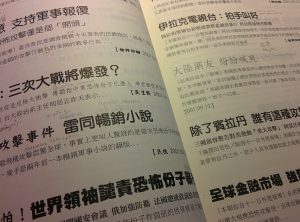Previewing before Chinese lessons is a simple yet frequently overlooked method to enhance learning. By previewing, you maximise the benefits of each lesson, allowing you to focus on areas where you truly need a teacher’s guidance.
Both students and teachers want to increase the efficiency of language lessons. Students aim to gain more from their investment of time and money, while teachers strive to provide the most effective instruction and help their students learn more.
Tune in to the Hacking Chinese Podcast to listen to the related episode (#206):
Available on Apple Podcasts, Google Podcast, Overcast, Spotify, YouTube and many other platforms!
There are many ways to make lessons more efficient, but one of the simplest and most effective methods is previewing. Despite its importance, many students don’t preview properly and learn less as a result. Interestingly, it’s often the most ambitious students who preview, though it’s the rest of the group who would benefit most from it.
Why previewing is essential for efficient learning
Previewing helps you use your time more efficiently. Whether you are a student in a foreign language course at a university or hire a private tutor to help you improve, previewing is essential. Let’s say you have a textbook and you cover one chapter per week in class. Maybe there will be a test at the end of the semester covering the entire book.
You can choose to position yourself on the spectrum between the following extremes when it comes to previewing:
- Not previewing at all: Most things you encounter in class will be completely new to you. This approach can work, but you’ll need extra time after the lesson to understand the material and review it to retain information. Unless the course is at a considerably lower level than you are, you will struggle to keep up with everything that happens in class. If the teacher asks you to use particular vocabulary or grammar patterns, you’re likely to make tons of mistakes.
- Previewing properly before each lesson: Attending the lesson becomes a matter of reinforcing what you’ve already learnt and clarifying anything you didn’t understand. Reviewing is necessary after the lesson to retain knowledge, but not to understand things in the first place. Unless the course is significantly above your level, you’ll understand almost everything and might even be able to explore new ways of using the language covered.
The interesting thing here is that both approaches take roughly the same amount of time, but previewing properly massively outperforms not previewing for several reasons. Let’s have a look!
5 reasons why you should preview before every lesson
Many of the reasons why you should preview are important because of how formal Chinese classes are often structured, but most of these are relevant even if you have a private tutor or participate in a language exchange. For example, I think it’s a terrible idea to force students to use complex grammar patterns or non-obvious vocabulary without being exposed to them first, yet this is common practice in almost all language classrooms I’ve been in.
Here are five reasons why previewing is great:
- Input precedes output: As I said earlier, you should encounter vocabulary and grammar in various meaningful contexts many times before using them. Your brain needs input to figure out what things mean and how they function in the language. You can’t be expected to use a chengyu correctly right after encountering it for the first time. By previewing, you can listen to and read the material multiple times before the lesson, giving you a better chance when asked to speak and write in class.
- Increased chances of incidental learning: Knowing most of the content before the lesson increases your understanding and the likelihood of picking up new things without effort. This includes extra words used by the teacher, which would otherwise be hard to focus on. Incidental learning of this kind requires you to understand almost everything, which won’t happen without previewing.
- Less confusion leads to more learning: When you already know what the lesson is about, understanding it becomes much easier and you can focus on nuances and details. For example, if you know the basic meaning of words in advance, you can pay attention to how they are used in context. You can avoid that feeling of kind of knowing what the teacher is saying, but not being sure until you look it up later. Looking it up in advance makes it much likelier that you will learn it.
- Teaching others is a great way to learn: Previewing is great even if your classmates don’t preview, even though this will slow down the pace significantly. Since you know more than they do, you can help them, which reinforces your knowledge and understanding. Teaching is a powerful learning tool!
- Boosted confidence and more enjoyable lessons: Being prepared for class makes you feel more in control and enhances your learning experience. This is especially important if the course level is higher than your current proficiency, and essential if it’s very hard.
Previewing maximises your use of high-quality study time. Without it, you waste valuable teacher time on tasks that could be completed independently. Factors like available study time, teacher time, and practice time with friends limit how much you can learn. By previewing, you ensure that class time is used effectively for tasks that truly require a teacher’s guidance!
What to preview and how to do it
Previewing isn’t difficult. Here’s a preview checklist adapted from this article about surviving and thriving in very difficult courses:
- Listen to the text at least once with overall understanding in mind
- Read the text at least once with overall understanding in mind
- Learn the basic meaning of characters and words
- Put the text on your phone and listen to it a few extra times if you can
- Look at grammar notes or other explanations when necessary
Focus on input; understand the words in the new chapter through reading and listening. If something is difficult or not well-explained, make a note to ask your teacher.
Previewing properly helps you identify the right questions to ask. Without previewing, questions often arise after the lesson when it’s too late to ask.
Preview more!
If you’re serious about learning Chinese, you must preview. Assuming you intend to master the course content, spending time before lessons is vastly superior to spending it all afterwards.
Unless you have unlimited access to teaching time, which is rare, maximise your lessons by previewing. It doesn’t require significantly more time, just a shift in effort from after the lesson to before it. By doing so, you will understand and learn more, making your classes much more enjoyable too!
Editor’s note: This article, originally published in 2016, was rewritten from scratch and massively updated in July, 2024.



5 comments
Very good point. Seems obvious, but is rarely said in class. I still catch myself unconsciously thinking of previewing a course as cheating, “spoiling” the teacher’s presentation. And there’s a slight fear that if I read ahead, I will learn things wrong. But the chances of that are far outweighed by the many advantages you mention.
Excellent advice and many good explanations given for previewing a lesson beforehand. Yet as another commenter mentioned, people feel like it feels like ‘cheating’ a bit. I used to feel the same way too and have felt guilty for doing it. A classmate told me they felt the same way. Another friend said they feel ashamed and too much of a nerd if they preview the material before class. Why this culture against it? I don’t know the answer. What I do know is we’re near the end of the semester and the students that don’t preview are the ones that get frustrated easily in class and get overwhelmed with the material easily.
Just forget about the people that can’t or won’t help themselves.
Thanks Ollie for another very pertinent topic.
Totally agree, I have “wasted” many classes by not previewing and thus need private lessons afterwards to review. I would also add that in my view, its highly important to try memorise those new words in your SRS system in advance, even if one is not fully aware of their meaning. This way you can focus on sentence patterns, the feel of the grammar, understanding of the text etc rather than getting bogged down in pronunciation and hanzi recognition
I tried both ways for years and hands down previewing is by far the best.
Bang on the money.
This is exactly what LTL Flexi Classes does and it’s a big reason why I love to study with them. Downloadable PDFs available at any time so you can study them and be fully prepared, and not scared, about a class
I would say that this is done in any serious language learning institution. It varies how strictly this is enforced, however. In some very serious institutions, you’re not even allowed to participate if you haven’t previewed, but most schools can’t afford that kind of approach as it will scare away more casual students!
It varies how strictly this is enforced, however. In some very serious institutions, you’re not even allowed to participate if you haven’t previewed, but most schools can’t afford that kind of approach as it will scare away more casual students!